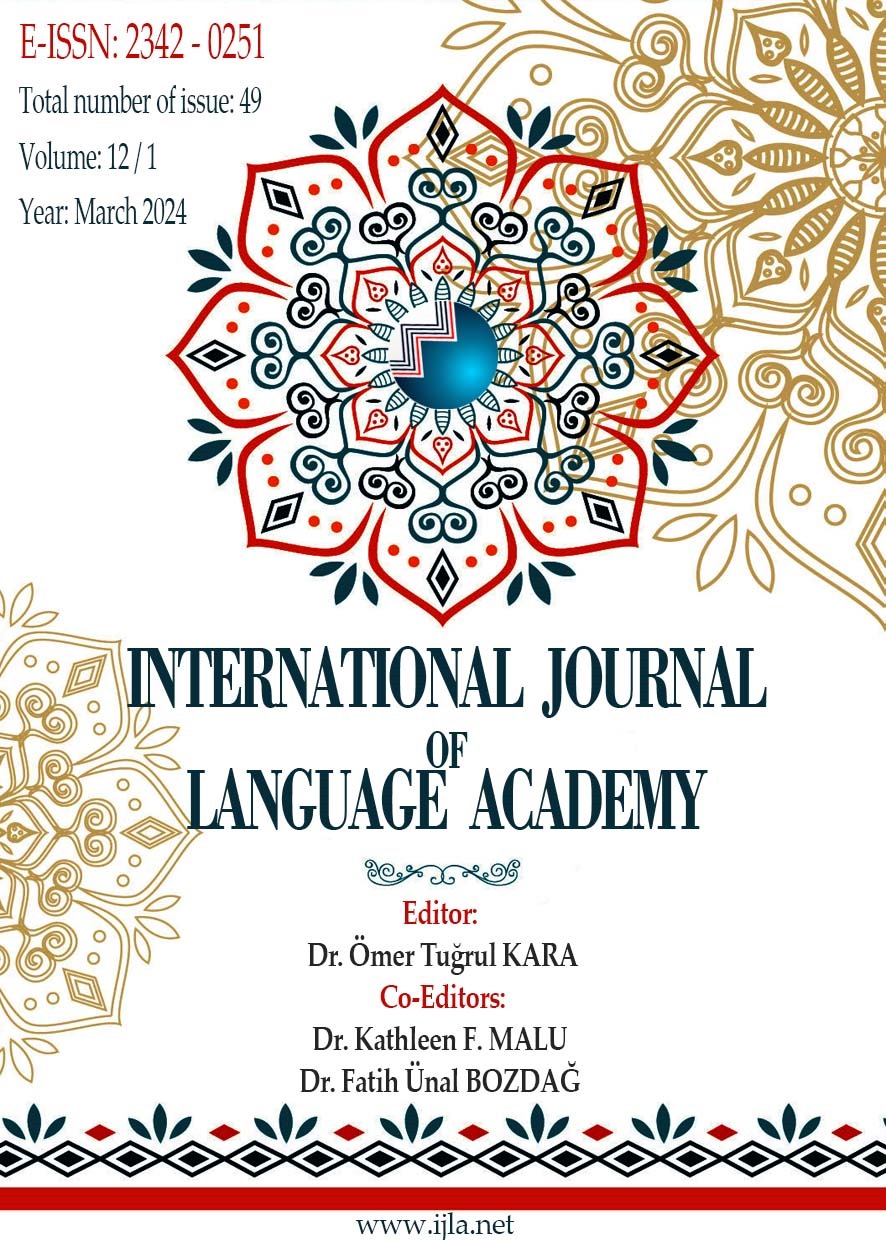Author :
Abstract
Yabancı dil öğretiminde konu içerikleri genel olarak hedef kültür üzerine odaklanır. Öğretim çıktıları her ne kadar hedef dil kazanımları olsa da aslında bu kazanımların sağlanması öğrencinin yazarken, okurken, konuşurken ve dinlerken hedef kültürde iletişime geçen bir birey rolüne bürünmesinden geçmektedir. Tiyatronun hemen her unsurundan beslenen drama tekniği öğrenilen dilin kültürel kodlarını, öğrenciye dağıtılan rollerde vermeye çalışır. Ancak dramada kullanılan diyalogların sanatsal ve yazınsal yanları da bir o kadar önemlidir. Temel amaç dil öğretimi olsa da, kullanan diyaloglar belirli bir sanat akımına dâhilse, drama sanatıyla dil öğretiminin yanı sıra sanat öğretimi de söz konusudur. Absürd tiyatronun öncülerinden Eugène Ionesco da kendisinin İngilizce öğrenirken absürd ve anlamsız bulduğu hem kültürel hem dilsel durumları oyunlarında işlemiştir. Anlamsızlık, kelime oyunları ve tekrarlamalar oyunlarının başlıca özellikleridir. Bu özelliklerle birlikte Ionesco’nun “Amerikalı Öğrenciler İçin Fransızca Konuşma ve Diksiyon Alıştırmaları” adlı diyalog serisi de içerdiği dilsel özelliklerle Fransızca öğretimi bakımından dikkat çekmektedir. Bu diyalog serisi ses ve konuşma başta olmak üzere dilbilgisi ve kelime öğretimi odaklı olup içerisinde kültürel özellikler barındırmaktadır. Bu çalışmada, söz konusu diyalogların absürd tiyatro ve Fransızca öğretimi bağlamında incelenerek dil öğretiminde kullanılan diyalogların aynı zamanda bağlı oldukları sanatsal ve yazınsal özelliklerinin de vurgulanması amaçlanmaktadır. Bu bağlamda diyalogların her biri absürd tiyatro ve Fransızca öğretimi bakımından ele alınmıştır. Diyaloglarda Amerikalı öğrencilere drama ile öğretilmek istenen Fransızca konuları tespit edilmiş ve bu konuların absürd tiyatro ve Ionesco tiyatrosu özelliklerini büyük bir ölçüde temsil ettiğine ulaşılmıştır. Böylece drama ile dil öğretiminde kullanılan diyalogların yazınsal ve sanatsal özelliklerinin önemi ve öğretimi ön plana çıkarılmıştır.
Keywords
Abstract
Subject content in foreign language teaching generally focuses on the target culture. Although the teaching outcomes are target language acquisitions, achieving these requires the student to communicate in the target culture while writing, reading, speaking, and listening. The drama technique nourished by almost every element of theater tries to convey the cultural codes of the learned language in roles for students. However, the artistic and literary aspects of the dialogues in drama are equally important. Although the primary purpose is language teaching, if the dialogues used are included in a particular art movement, art teaching is also possible in addition to language teaching through drama art. Eugène Ionesco, one of the pioneers of theater of the absurd, also used cultural and linguistic situations in his plays, which he found absurd and meaningless while learning English. Nonsense, puns, and repetitions are the main features of his plays. With these feature, the dialogue series of Ionesco called "French Speaking and Diction Exercises for American Students" draws attention to teaching French with linguistic features. It focuses on teaching grammar, vocabulary, pronunciation, and speaking by cultural features. This study aims to examine the dialogues within the frame of the theater of the absurd and French teaching and to emphasize the artistic and literary features of the dialogues used in language teaching. In this context, each of the dialogues was analyzed in terms of the theater of the absurd and French teaching. In dialogues, the French topics for American students through drama were identified, and it was found that these topics represented largely the characteristics of theater of the absurd and Ionesco. Thus, the importance and teaching of literary and artistic features of the dialogues used in language teaching through drama were brought to the fore.





